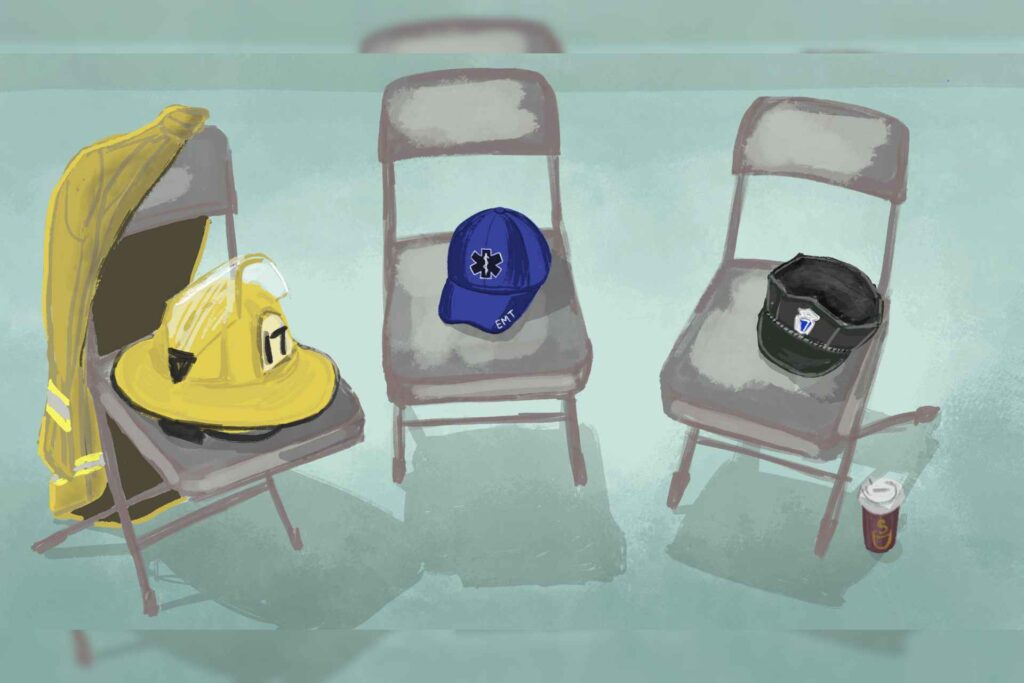Controlling traumatic situations is synonymous with the daily duties of first responders, yet many mental health programs to combat the increasing stress they encounter are lacking. That’s why West Virginia University researchers are identifying steps policymakers and community members can take to aid front-line workers.
“With elevated risk for suicide and other mental health issues among first responders, we have a significant public health problem,” said Michael Fisher, assistant professor in the WVU School of Public Health Department of Health Policy Management and Leadership, who led a study analyzing mental health and first responders in one state.
“These issues rarely make front-page news and may not always garner widespread support and financial resources. This situation began to change amid the COVID-19 pandemic, but policymakers and the public need to be informed about these issues so that appropriate policies, programs and resources can ensue.”
Results of the study led researchers to offer five recommendations: link first responders with culturally competent clinicians; establish one or more centralized organizations to coordinate policy and programming activities; examine models of regional collaboration; expand mental health policy and program research and evaluation efforts; and pass legislation to advance mental health policy and program coordination and implementation.
Two federal proposals — the Fighting Post-Traumatic Stress Disorder Act and the Helping Emergency Responders Overcome Act — haven’t gained traction. However, measures on state and local levels are showing promise and those are the ones Fisher and his team want to hold up as examples.
“I wanted to investigate some of those activities,” Fisher said. “There is a dynamic landscape of emerging approaches to mental health prevention and treatment for first responders, but there is still so much to be learned, both about the effectiveness of specific approaches and about the landscape of programs available or, in some cases, not available.”
Fisher chose to focus on Ohio for the study because it is one of the few states where extensive support measures for first responders have been enacted. In 2021, legislation was passed to examine expanding eligibility for workers’ compensation benefits for first responders suffering from PTSD. The same year, Ohio implemented a state-level office focused on the well-being of first responders to coordinate specialized support and training.
The study, published in the Community Mental Health Journal, elicits perspectives on policy and programmatic activities for front-line personnel. Joining Fisher in the study was Catherine D. Lavender, Department of Occupational Therapy & Occupational Science, College of Health Professions, Towson University.
“We were not looking to quantify or evaluate aspects of policies or programs, but instead seeking to understand contextual factors influencing policy or program development and implementation,” Fisher said. “We had two research questions guiding our study. First, how are Ohio’s first responder communities advancing mental health policies and programs? Second, what are the opportunities and challenges faced by these individuals?”
Between March 2021 and June 2022, researchers interviewed firefighters, emergency medical service professionals and law enforcement officers employed in Ohio. Their insights revealed increases in job stress and first responder deaths by suicide as factors intensifying the need for mental health programs and policies. At the same time, they said a decrease in mental health stigma opens the door for more people to seek help.
Most participants said they saw a heightened workload, often because of staffing constraints. On top of that, situations such as violent crime and drug overdoses added to their stress. Although they were able to complete their duties, they recognized it came with an emotional, physical and mental cost. For example, these pressures can result in compassion fatigue — physical and mental exhaustion and emotional withdrawal experienced by those who care for sick or traumatized people over an extended time.
While nearly all interviewees cited mental illness stigma as a concern for first responder professions, they noted a decline in those levels as colleagues — particularly the younger ones — are more open to peer discussion. However, they said a divide still exists with some first responders thinking they will appear weak or face job-related repercussions if they admit to mental health struggles.
The size of departments or jurisdictions played a role in the types of mental health support available, participants said. Access to programs ranged from extensive peer support to health-focused apps that connect them to resources. While small or rural departments sometimes face barriers to robust programming, others benefit from collaborations and less formal resources they term as “mutual aid agreements for mental health.” Insurance coverage for obtaining mental health treatment also reportedly varied, depending on the size and resources of the jurisdiction.
Fisher plans to use the study as preliminary data for future research which could focus on several themes raised by participants that he believes warrant further investigation.
“I hope this study, in conjunction with other research on first responder mental health and wellbeing, can raise awareness and inform policy and program development,” Fisher said.













